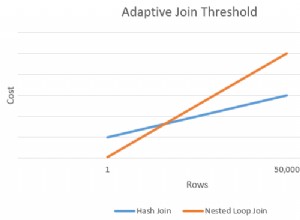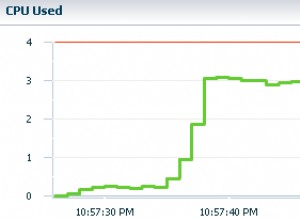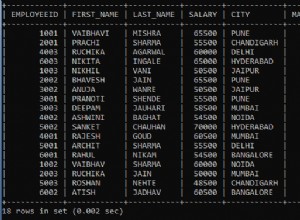Ich habe versucht, zwei Datenbanken zu verwenden, um Ihren Fall zu simulieren, und die Lösung unten gefunden:
1. Szenario:
- Datenbank
schema1, die von Django verwaltet wird (Lesen &Schreiben) - Datenbank
schema2, was NICHT ist verwaltet von Django
2. Schritte:
- Migrationen erstellen
python manage.py makemigrationsfür Ihre Modelle - Generieren Sie SQL für Ihre Migration:
python manage.py sqlmigrate app 0001.(angenommen, der Name der generierten Migrationsdatei lautet0001_initial.pyab Schritt 1 )
Die SQL für diese Migration sollte wie folgt aussehen:
CREATE TABLE `user_info` (`id_id` integer NOT NULL PRIMARY KEY, `name` varchar(20) NOT NULL);
ALTER TABLE `user_info` ADD CONSTRAINT `user_info_id_id_e8dc4652_fk_schema2.user_extra_info_id` FOREIGN KEY (`id_id`) REFERENCES `user_extra_info` (`id`);
COMMIT;
Wenn Sie die obige SQL direkt ausführen, erhalten Sie am Ende einen Fehler wie diesen:
django.db.utils.OperationalError: (1824, "Failed to open the referenced table 'user_extra_info'")
Das liegt daran, dass Django davon ausgeht, dass alle Ihre Migrationsschritte in derselben Datenbank ausgeführt werden . So kann es die user_extra_info nicht herausfinden in schema1 Datenbank.
3. Folgende Schritte:
-
Geben Sie explizit die Datenbank
schema2an für die Tabelleuser_extra_info:ALTER TABLE `user_info` ADD CONSTRAINT `user_info_id_id_e8dc4652_fk_schema2.user_extra_info_id` FOREIGN KEY (`id_id`) REFERENCES schema2.user_extra_info (`id`); -
Führen Sie die überarbeitete SQL manuell in
schema1aus Datenbank. -
Teilen Sie Django mit, dass ich die Migration selbst ausgeführt habe:
python manage.py migrate --fake -
Fertig!!
Quellcode Als Referenz:
models.py
from django.db import models
class UserExtraInfo(models.Model):
# table in schema2, not managed by django
name = models.CharField('name', max_length=20)
class Meta:
managed = False
db_table = 'user_extra_info'
class UserInfo(models.Model):
# table in schema1, managed by django
id = models.OneToOneField(
UserExtraInfo,
on_delete=models.CASCADE,
primary_key=True
)
name = models.CharField('user name', max_length=20)
class Meta:
db_table = 'user_info'
settings.py
# Database
# https://docs.djangoproject.com/en/2.1/ref/settings/#databases
DATABASES = {
'default': {
'ENGINE': 'django.db.backends.mysql',
'NAME': 'schema1',
'USER': 'USER',
'PASSWORD': 'PASSWORD',
'HOST': 'localhost',
'PORT': 3306,
},
'extra': {
'ENGINE': 'django.db.backends.mysql',
'NAME': 'schema2',
'USER': 'USER',
'PASSWORD': 'PASSWORD',
'HOST': 'localhost',
'PORT': 3306,
}
}
DATABASE_ROUTERS = ['two_schemas.router.DBRouter']
router.py
class DBRouter(object):
"""
A router to control all database operations on models in the
auth application.
"""
def db_for_read(self, model, **hints):
"""
Attempts to read auth models go to auth_db.
"""
if model._meta.db_table == 'user_extra_info':
# specify the db for `user_extra_info` table
return 'extra'
if model._meta.app_label == 'app':
return 'default'
return None
def db_for_write(self, model, **hints):
"""
Attempts to write auth models go to auth_db.
"""
if model._meta.db_table == 'user_extra_info':
# specify the db for `user_extra_info` table
return 'extra'
if model._meta.app_label == 'app':
return 'default'
return None
def allow_relation(self, obj1, obj2, **hints):
"""
Relations between objects are allowed if both objects are
in the primary/replica pool.
"""
db_list = ('default', 'extra')
if obj1._state.db in db_list and obj2._state.db in db_list:
return True
return None
def allow_migrate(self, db, app_label, model_name=None, **hints):
"""
Make sure the auth app only appears in the 'auth_db'
database.
"""
if app_label == 'app':
return db == 'default'
return None




